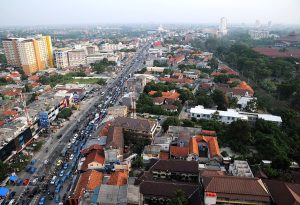Source: www.morningstarnews.org
Date: September 20, 2023
Protest results in agreement to temporarily leave worship site.
By Our Indonesia Correspondent

Depok, West Java Province, Indonesia. (Indrianto Eko Suwarso ANTARA FOTO, Creative Commons)
SURABAYA, Indonesia (Morning Star News) – A Muslim mob protesting a church site outside Jakarta, Indonesia on Saturday (Sept. 16) has forced the congregation to temporarily move worship services online, sources said.
The Indonesia Bethel Church (Gereja Bethel Indonesia, or GBI) reached a police-brokered agreement to forego worship services at their building in Depok, just south of Jakarta, for at least two weeks after the protestors shouted and pushed against the front gate at 7 a.m., detiknews.com reported. There were no church members in the building at that time.
The church had used the small three-story building for the first time on Sept. 10, under police guard, after the lease on their prior location expired, according to published reports.
“At 7 a.m., more than about 50 people wearing turbans and other religious attire gathered around the chapel,” Arif Syamsul of the GBI church told detiknews.com. “They came to our chapel, and while shouting, they banged it [the perimeter fence gate] and then dispersed.”
Arif heard about the demonstration from area residents and approached the venue as the Muslims were walking to it, he told Kompas.com. The building is on Bukit Cinere Raya Street, Gandul, Cinere, in Depok.
“In front of the chapel, they pushed the gate, but not hard. There was no [church] activity then,” Arif said, adding that the mob dispersed after about 30 to 45 minutes.
Depok police, a commander of the district military command, staff members of the Institute of Civil Empowerment (Lembaga Pemberdayaan Masyarakat) and the neighborhood head ensured that the mob did not damage the building, Arif reportedly said.
Police forged an agreement between the church and area Muslims to move worship services online for two weeks while permit processing is completed, according to Depok Metropolitan Police Chief Ahmad Fuady.
“The result of the agreement is that temporary worship will take place online for two weeks,” Fuady reportedly said. “Why two weeks? Because documents will be processed for two weeks. After the permit is issued, they can then carry out offline worship.”
Normally no permit is necessary to worship in a rented building, Arif told Kompas.com.
“We always rent shop-houses because the law requires us to obtain no permits,” Arif reportedly said, adding that the church had obtained permission from the neighborhood head (Rukun Tetangga), the citizens head (Rukung Warga) and the head of the sub-district.
Local members of the Institute of Civil Empowerment (Lembaga Pemberdayaan Masyarakat) had demanded church leaders obtain approval from area residents, Arif told detiknews.com. The church obtained the approval of 80 residents, but the institute refused to acknowledge it, Arif said.
Rights Objections
Rights advocates said that, beyond security agencies ensuring no damage was done to the church’s rented building, government officials need to ensure freedom of worship.
Andreas A. Yewangoe, a member of the Steering Committee of the Presidential Working Unit for the Development of Pancasila Ideology, said from The Hague that the government needs to ensure rights when religious minorities are under attack.
“The state should be present for the sake of law enforcement. Should there be an impression that the state is weak, the same thing will keep on repeating in the future – it will become habitual,” Yewangoe told Morning Star News by phone from the Netherlands.
Hendrik Tangke Allo, deputy chairman of the Depok People Representative, visited the site on Saturday (Sept. 16), saying, “The government must be present to provide a sense of security and comfort for all people of whatever religion to carry out their worship properly, including at this chapel in Cinere.”
He added that congregation should not have been forced out of their building even temporarily.
“I heard that the Depok government, through the National and Political Unity Body [Badan Kesatuan Bangsa dan Politik], held a meeting and decided that worship activities here would be temporarily stopped,” Hendrik said. “This is what I regret most now; it is only possible online.”
Bonar Tigor Naipospos, deputy chairman of Setara Institute, which advocates democracy and human rights, particularly religious freedom, in Indonesia, said lack of government support leaves Christians and other minorities feeling “ambiguous.”
“There is an ambiguous feeling among minorities; on the one hand, they are aware that they are part of a plural nation-state, but on the other, they are aware that to be part of that nation-state, they can’t take it for granted,” Naipospos said. “They must continue to fight for their social identity.”
Indonesia ranked 33rd on the Christian support organization Open Doors’ 2023 World Watch List of the 50 countries where it is most difficult to be a Christian. Indonesian society has adopted a more conservative Islamic character, and churches involved in evangelistic outreach are at risk of being targeted by Islamic extremist groups, according to Open Doors’ WWL report.
“If a church is seen to be preaching and spreading the gospel, they soon run into opposition from Islamic extremist groups, especially in rural areas,” the report noted. “In some regions of Indonesia, non-traditional churches struggle to get permission for church buildings, with the authorities often ignoring their paperwork.”
